- Home
- Gaelen Foley
Lord of Fire Page 19
Lord of Fire Read online
Page 19
“Oh, so you think I’m stupid?” she retorted, jumping to her feet.
“Not stupid, naive. Sheltered. I like you that way. I don’t want to fight with you, Alice. In my eyes, you are—” He cast about for words. “—an angel, a goddess. But these matters have nothing to do with you, nor can they. If you want to be with me, that is my only rule. Respect my privacy.”
“Privacy or secrecy?”
“Call it what you will. Can you live with that—at least for a week? Can you try?”
She folded her arms over her chest and narrowed her eyes, scrutinizing him.
He heaved a sigh and looked at the wall. “Well, think it over. I’m going in to dinner. Will you join me?”
When she did not answer, only staring at him in reproach, he turned around and strode out.
She huffed to herself when he had gone. Little girl from Hampshire! Don’t ask questions? He had brushed her off as though she were a child, but still, fool that she was, she had no desire to leave him. She wanted him. His keeping her here had been outrageous, but somehow, over the course of the day, she had come to view it as a delicious opportunity. She thought of Harry, sick with the chicken pox, and felt a flash of guilt, but he had his mama and Peg. Besides, what Alice had said to Lucien was true—she was alone, essentially. She had her suitors, but they did not know her and were all so self-absorbed or dull-witted that they did not even realize they didn’t know her. They were safe choices, but they did not make her blood burn with passion. Lucien Knight did. Perhaps in time he would trust her enough to tell her his secrets.
She stood there pondering the dilemma for a few minutes more when her stomach rumbled, rousing her to action. She started toward the dining room, but her mulling glance happened upon the chess table as she walked past it. The board had been left untouched from the previous morning when Lucien had sprung his trap on her and Caro. Alice’s gaze homed in on the little carved horse head of the black knight, with which Lucien had trounced the white queen.
A sly smile curved her lips as she noticed he had left himself wide open. If only he were there to see it! She picked up an unassuming white pawn and skipped it gently over the black knight. He was right, she thought with a renewed strength and calm; she was sheltered. But her tranquil country life at Glenwood Park had taught her one virtue above all others: patience.
Through patience, her mother always used to say, any battle could be won. Even today, the dear old man, Mr. Whitby, had warned her that, with Lucien, she would need all the patience—and gentleness—that she could muster. Setting the carved piece in the palm of her hand, she gave the knight a small kiss, then set it down daintily on the side of the board and, with a foxy smile worthy of Lucien himself, went in to dine.
In the elegant suite at the Pulteney Hotel, Rollo Greene stared, aghast, as the soulless blond giant looked in the mirror and gave his white cravat a final tug, then slipped his loaded pistol into the holster concealed beneath his formal black tailcoat.
“Not on Guy Fawkes Night, Bardou, for the love of God!” Rollo choked out. “It is a festival night! The streets will be filled with civilians—children!”
“You were assigned to assist me, Greene. Do not tell me how to carry out my mission,” Bardou replied coolly.
“Look here, sir, I can’t speak for you French, but massacring civilians is not how we in America conduct business!”
Bardou laughed. He turned away and swaggered across the plush room to Sophia. Her arms folded over her chest, the tall Russian beauty leaned against the console table by the wall with all the sleek, wary mystery of a Siamese cat. Rollo saw the fear and hostility that flared in her almond-shaped eyes as Bardou approached her, but she did not attempt to escape his attentions anymore, as she had earlier, resigned to having been overpowered by the man. She flinched slightly as Bardou grasped her hips and pulled her against him, burying his face in the crook of her neck.
Rollo winced and looked at the ground. He wished there was something he could do to help her, but he could not afford to oppose Bardou on his treatment of the woman when it took all his nerve to press the matter of Guy Fawkes Night. The annual bonfire festival was held throughout England every year on November the fifth, two weeks away.
Bardou was still concealing the details of his plan from him, but Rollo had begun to realize that the former Napoleonic spy had far more mischief up his sleeve than he had been hired to wreak. Clearly, Bardou’s French hatred for the English ran much deeper than did the Virginia planters’ grudge. They had wanted something done on a smaller scale, more specifically aimed at the British military, preferably the navy.
Rollo knew that if somebody didn’t stop Bardou, innocent people were going to die; and if the world found out that a group of powerful Americans was behind the coming firestorm, there would be shame and infamy for his president, dire consequences for his country. Not to mention his own career would be ruined for having bungled his assignment.
“Bardou, I am only asking you to reconsider the timing of your attack,” he wheedled him. “I am certain that the gentlemen in Virginia intended no such radical action against the populace of London—”
“Shut your mouth!” Bardou roared, turning on him, tearing himself away from his mistress.
Rollo’s eyes widened as Bardou crossed the room to him in three titan-sized strides, grasped him by the lapels, and threw him up against the wall, nearly putting him through it.
“I give the orders; you follow them,” he snarled. “Stay out of my way, or you are going to end up at the bottom of the river.” He released him roughly. “Now, get out of here.”
Rollo’s heart pounded so hard with terror that he thought it would give out on him. His whole body felt bruised from being slammed against the wall. He glanced at Sophia. She just stared back at him, silent and detached as a cat; then he looked into Bardou’s insane, pale blue eyes.
“I said go,” the man growled.
Rollo did not need a second warning. He fled.
Claude Bardou stared for a moment at the door, which Greene had slammed behind him, then turned to Sophia. “I don’t trust him.”
“You don’t trust anyone, Claude. You’re not capable of it. Not even me.”
“Especially not you,” he replied with a narrow smile. “Follow him. Go. Now.”
She heaved an irritated sigh. “Must I?”
“I know a rat when I smell one. If he tries to betray me, kill him.”
“Claude, I cannot kill the American. He is your liaison!”
“I don’t need him anymore. Just do it, Sophie. Do it for me,” he murmured, icy warning embedded in the softness of his tone.
She glared at him in simmering rebellion, pulled out her weapon and checked it, then slid the pistol back into her thigh holster, beside the sheath of her evil-looking dagger.
“Keep me informed of what is happening. And Sophia,” he added, “don’t try to run off.”
“Never, darling.” She threw her long, fur-lined cloak over her arm and strode out, giving him a dirty look as she pulled the door shut.
Only minutes after her exit, a knock sounded at the door. How prompt these English were, Bardou mused cynically. He placed his monocle in his right eye, smoothed his short-cropped hair, then went to answer the door, transforming himself mentally as he crossed the room into Prussian Baron Karl von Dannecker.
What Claude Bardou had not seen fit to tell his American moneymen was that he had a personal score to settle in addition to his political vengeance. For the former, he needed Ethan Stafford to introduce him into London Society. They had gone out among the ton twice already, and Bardou had made casual, preliminary inquiries about his hated enemy. Bardou had decided that the only way he could swallow the humiliation of Napoleon’s defeat was by winning the private, unfinished war between him and Lucien Knight. The one man he had failed to break—his prisoner who had, incredibly, bested him.
If only he could annihilate Lucien Knight, he knew he could bear everything that had gone
wrong—the failure of the cause he had devoted his life to, Bonaparte’s shameful abdication, the impossibility of ever returning home to France. Lucien Knight embodied all that Bardou hated most about the English. Knight’s insufferable, British stiff upper lip had barely quavered no matter what kind of tortures Bardou had put him through.
He could not live with the thought of that gallant, aristocratic gentleman-spy living a long, happy life on this puny island of the victors, when Bardou’s own life and his future had been decimated. To stalk his enemy, Bardou needed Ethan Stafford to conduct him into the world of London’s rich and titled so that he could learn more about Knight and how best to destroy him. Though Bardou had held him captive for five weeks, Knight had told him almost nothing. Since he had held up against physical suffering, Bardou had begun considering ways to torment his heart and mind. Unfortunately, Knight had no wife or children, but he did have four brothers, two of whom were in London.
Bardou was leery of attacking Lucien Knight’s twin, the formidable Colonel Lord Damien Knight, but the rakish Lord Alec, the youngest of the Knight brothers, seemed somewhat easier prey. It was a pity that their little sister, Lady Jacinda, was away at Vienna, he thought as he crossed to the door. She would have been perfect for his purposes. Bardou had no choice but to resort to the women in Lucien Knight’s life. He intended to gain an introduction tonight to his enemy’s most recent mistress, Lady Glenwood.
Masking his dark thoughts behind a cool smile, he opened the door. “Good evening, Herr Stafford.”
Ethan Stafford bowed to him. “Von Dannecker. Are you ready for our jaunt to Vauxhall?”
“I have been looking forward to it all day,” he replied as he pulled on his greatcoat and locked his hotel door.
The young English gentleman no doubt found this whole arrangement strange, but every man had his price. If the charming Mr. Stafford had any inkling that Baron von Dannecker was not who he seemed, he was too wary—and too determined to keep his showy house and fast carriage—to ask questions.
A few minutes later, they were racing eagerly through the streets of London in Stafford’s fashionable drag. With his pockets full of gold once more, the young man was in high spirits. Stafford showed off his skill at four-in-hand driving at such a reckless pace that it was no time at all before they arrived at the riverside and took the ferry across to the pleasure gardens.
Stafford showed him the lantern-lit garden paths where lovers held rendezvous when the weather was warmer, and the artificial waterfall that he said was run every night punctually at nine, to the wonder of all who beheld it. They strode into the gaudy main pavilion that throbbed with orchestral music and beamed with bright illumination. Bardou scanned the colorful crowd, ever watchful behind his studied air of high, remote, German pride.
“Ah, there’s Lady Glenwood,” Stafford murmured, giving him a sly look askance. “I told you she’d be here.”
He followed Stafford’s nod toward a scantily clad brunette with bouncy curls that framed her heart-shaped face and enormous tits. Bardou raised his eyebrow in most prurient interest. The baroness was surrounded by fawning men.
“What a body, eh?” Stafford murmured, elbowing him in the ribs.
Bardou gave him a sly look. “But I heard she is involved with someone . . . What was the name? Lucien Knight. Do you know the man?”
Stafford blinked in surprise. “Of course.” He lowered his voice. “It was at one of Lord Lucien’s parties that Rollo Greene first contacted me about . . . helping you.”
“Oh, really?” Bardou murmured, concealing his burst of rage. I knew it. That little lard-ass rat had lied to him, had told him he didn’t know Lucien Knight! Thank God he had sent Sophia to watch the American, he thought in disgust. Sometimes, at any rate, luck was with him.
Having parties! he thought in scorn. These English were so arrogant, so sure of their victory. It filled him with smug satisfaction to know that Lucien Knight was at his country house having parties rather than on his guard. As long as Bardou knew exactly where Knight was and what he was doing, then he was the one in control and could strike at his leisure. He had no intention of attacking Knight at his country house, for it was foolish to give the enemy the home advantage. No, Lady Glenwood might be just the means to lure Knight back to London when Bardou was fully ready for him.
“Is he in love with her?” he asked Stafford casually.
“Well, apparently, he wanted her so badly that he stole her away from his own brother. I don’t know if that’s love, but it’s something, don’t you think? Personally, I think she’s toying with both of them. With a body like that, she can get away with it,” he added under his breath.
Bardou murmured hearty assent as they sauntered over to the woman. Her rouged lips were moving rapidly with her prattle. As they joined her circle, Bardou frowned slightly. The woman chattered too fast for him to follow her English. He had to translate her words a bit more slowly in his mind.
“I couldn’t stay in the country. I tried! Honestly I did, but a child can just as easily recuperate in Town as he can in Hampshire, can’t he?”
The fops were laughing and agreeing with every word she said as they stared at her chest.
“When are you going to bring that pretty sister-in-law of yours back to Town?” one asked.
“Oh, Miss Montague is very ill, the poor dear,” she said, clucking her tongue in regret. “She is confined to her room at Glenwood Park. Influenza. The doctor said she won’t be allowed out for at least another week—so you will have to make do with me, mon chéri!”
“Lady Glenwood,” Stafford spoke up. “My friend here is visiting from Prussia—”
“Prussia, eh?” The slightly drunken Englishmen gathered around her hailed him with approval. “A toast to General Blücher!”
“Thank you, sirs.” Bardou nodded stiffly to them. His smile thinned only slightly, but hatred churned within him as the cheerful fools lifted their glasses to the stalwart Prussian general.
Stafford laughed at their antics and nodded to Lady Glenwood with gentlemanly grace. “As I was saying, the baron has never been to our country before, and I am eager to impress him with the beauty of our English roses. I could think of none better to dazzle him than you. May I introduce you?”
“What a flatterer you are, Stafford! Of course.” The woman turned her beaming smile on Bardou. Hardened as he was, he was momentarily enchanted.
She might be a hated Anglaise, but he knew instantly that she was his favorite type of woman. Besides, she would be very useful.
“Lady Glenwood, may I present Baron Karl von Dannecker of Berlin,” he said formally. “Von Dannecker, the beautiful Lady Glenwood.”
“How do you do, my lord? Welcome to our homeland,” she said gaily. “I do not know that I can dazzle you as Stafford commands, but I will certainly endeavor to try.”
“Lady Glenwood, you have already succeeded,” Bardou replied as he bent over her hand and kissed it.
“Charming,” she murmured, a gleam of aroused interest in her eyes. “You can call me Caro.” Her gaze flicked brazenly across his shoulders and down the length of his body, then locked with his in instant, mutual lust. “I have always been a great admirer of the Prussians,” she purred. “They are so . . . big. So . . . forceful.” The thin, greasy-haired fop beside her snickered at her flirtatious tone. Caro rolled her eyes, looking askance at him. “Lord von Dannecker, allow me to present my little brother, Viscount Weymouth. Niles, this is Baron von Dannecker.”
Bardou nodded to the stringy, ill-kempt fellow, who swayed on his feet. Weymouth’s skin had a sickly pallor, and his small brown eyes were glazed. “How d’ ye do,” he mumbled, then giggled into his wineglass.
Opium, Bardou thought, masking his contemptuous sneer.
“Beau-nasty, will you behave? Pay him no mind, my lord. He is utterly foxed,” Caro scolded, giving her brother’s scraggly chin a fond pinch as though he were a child. “Don’t befriend him or he’ll only ask you for a loan.�
� She winced in distaste as Weymouth, quite in his own world, scratched his dirty hair then examined the grimy contents beneath his fingernails.
Even Bardou was revolted. “Lady Glenwood, would you do me the honor of a dance?”
“Why, I’d love to.”
“Best to do as he says, sister,” Weymouth mumbled. “Mustn’t trifle with those Prussians.”
Bardou gave him a warning look and offered her his arm. She took it with a smile. Weymouth’s tittering laugh followed them as Bardou led her toward the dance floor. She gave him a curious look as she noticed his slight limp, then stopped and turned to him.
“We needn’t dance if you would rather not,” she said prettily.
“But I don’t wish to disappoint you,” he replied in a low tone.
She cast a quick, meaningful glance below his waistline, then peered up at him through her lashes. “Oh, my dear von Dannecker,” she murmured, “I don’t think that would be possible.”
Chapter 10
Three days passed. Miraculous days. Lucien and Alice became inseparable. If the world still existed beyond the limestone pinnacles that encircled the valley, neither of them wanted to know of it. She complied with his wishes about not asking questions; he refrained from seducing her; and together they achieved a precarious joy that was artless, simple, and chaste. Their days were full of mellow autumn sunlight and country pursuits: fishing, riding, shooting at pheasant and hare. They lived off the land and feasted like the kings of the earth upon the harvest’s abundance, drank much wine and talked themselves hoarse before the fireplace into the wee hours of the night. Sometimes they played chess. Sometimes they read poetry. On Tuesday it rained, so they played a jolly game of bowls in the dusty old ballroom, then explored the rambling Tudor mansion, for Lucien himself had not yet seen all the bedrooms. At other times, they merely sat holding each other in warm silence, staring into each other’s eyes, each pondering the mystery of the other and of their deepening bond. How narrowly, Alice often thought, they might have missed out on their chance meeting.

 My Ruthless Prince
My Ruthless Prince Paladin's Prize
Paladin's Prize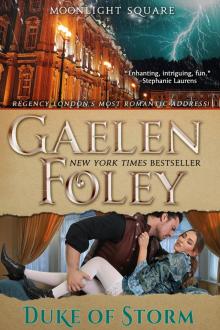 Duke of Storm
Duke of Storm Duke of Scandal (Moonlight Square, Book 1)
Duke of Scandal (Moonlight Square, Book 1) My Irresistible Earl
My Irresistible Earl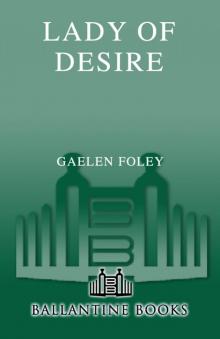 Lady of Desire
Lady of Desire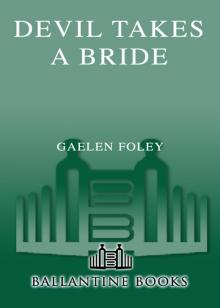 Devil Takes A Bride
Devil Takes A Bride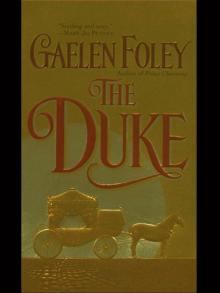 The Duke
The Duke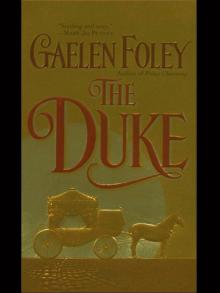 The Duke: The Knight Miscellany Series: Book 1
The Duke: The Knight Miscellany Series: Book 1 Her Secret Fantasy
Her Secret Fantasy Her Only Desire
Her Only Desire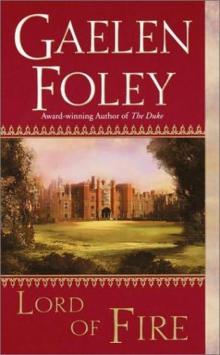 Lord of Fire
Lord of Fire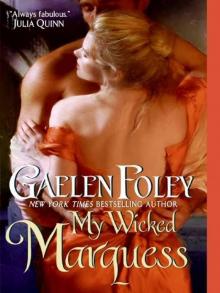 My Wicked Marquess
My Wicked Marquess My Scandalous Viscount
My Scandalous Viscount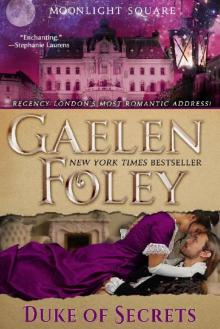 Duke of Secrets (Moonlight Square, Book 2)
Duke of Secrets (Moonlight Square, Book 2)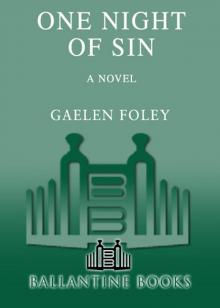 One Night of Sin
One Night of Sin The Secrets of a Scoundrel
The Secrets of a Scoundrel Dream of Me (Harmony Falls, Book 1)
Dream of Me (Harmony Falls, Book 1) His Wicked Kiss
His Wicked Kiss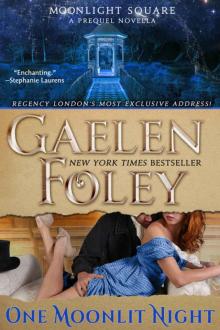 One Moonlit Night (Moonlight Square: A Prequel Novella)
One Moonlit Night (Moonlight Square: A Prequel Novella)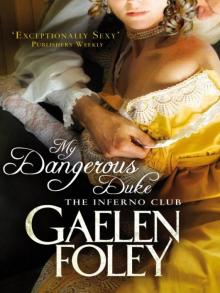 My Dangerous Duke
My Dangerous Duke